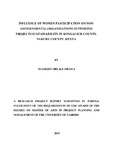| dc.description.abstract | In the wake of clamour for women empowerment, gender equity campaigns and gender
mainstreaming discourse many studies have been conducted on the various aspects of women
participation. NGOs claim has been that development projects they support use participatory
approach and involve active participation of the female gender especially in the
identification, implementation and the monitoring and evaluation stages. Conversely, in as
much as the above may be true on the side of NGOs, the reality on the ground speaks
otherwise. The main focus of the study was to explore the influence of women participation
on the NGO supported projects sustainability in Rongai Sub County, particularly trying to
examine the effectiveness of the current influence women participation, analyze the
perception of women and the key informants towards the influence women’s participation,
ascertain the determinants that influence the level of women participation in Non
Governmental Organization supported projects. The proposed study used descriptive survey
design with both quantitative and qualitative approaches. The target population for the study
constituted 70,213 women from the four administrative divisions of Ngata, Kampi Moto,
Rongai and Solai in Rongai Sub-county and 10 NGO Project officers. The sample size for the
study was 382 women at a confidence level of 95% and a margin error of 5.0%. The study
used stratified sampling on the administrative divisions in the area to obtain a representative
sample of the target population and balance of information to be gathered. Proportionate
allocation of the sample size was based on the population of each Division and each
respondent picked through simple random sampling. The study utilized closed ended
questionnaire and interview schedules for key informants to collect primary data. The
questionnaire was pre tested on a sample of 25 women not part of the sample to help
ascertain the reliability of the instruments using Cronbach’s alpha coefficient where α=0.73
was obtained. The validity of the instruments was determined through expert judgement by
the supervisor and other research experts from the University of Nairobi. Data was analyzed
using SPSS (ver. 21) where both quantitative and qualitative data analysis approaches were
applied appropriately. Descriptive statistics helped in explaining the findings of the study by
use of mode, frequency tables, means, percentages and Pearson’s Product Moment
Correlation analysis was done to determine the relationship between women participation and
project sustainability. The study established that with regards current influence of women
participation in NGO support projects sustainability, men tended to participate more at 45%
in the NGO supported projects than women whose participation was 35%.Concurrently, 69%
of the women were not in any leadership positions in the NGO supported projects that they
were benefiting from. This however is despite the finding that the NGO supported projects in
the sub-county targeted women at 27%. The study further revealed that 74% of the women
perceived the projects viewed them as mere beneficiaries of the projects and not as partners
who would help run the projects, the study established that positive relationships (r=0.47)
existed between the women perception on project monitoring and project sustainability.
Determinants influencing women participation had a positive relationship with project
sustainability (r=0.36).The study also established that positive relationships existed between
level of education and women participation (r=0.49). This implies that level of education
strongly influences women participation in NGO supported. The study recommended the
need for NGO supported projects, to incorporate women more during the entire project cycle
of the initiated Non Governmental Organization supported projects within their communities. | en_US |

